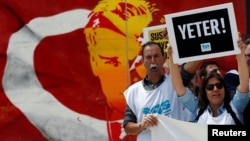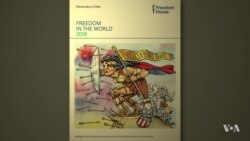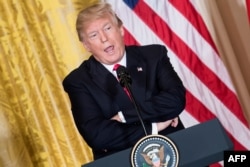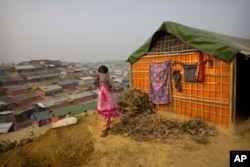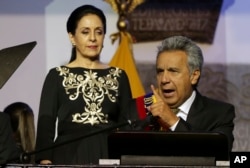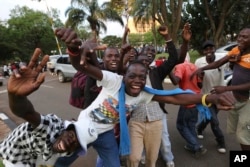A new report released by the independent watchdog organization Freedom House says that democratic principles such as election integrity and freedom of the press are weakening globally for the 12th consecutive year.
"There are more countries — in the case of 2017, many more countries — that showed declines in freedom than showed improvements," says Arch Puddington, Freedom House Distinguished Scholar for Democracy Studies, who spoke with VOA ahead of the report’s release.
WATCH: Freedom in the World 2018
According to Freedom House, which analyzed data from 195 countries over the 2017 calendar year, 88 countries were rated "free," 58 countries were rated "partly free," and 49 countries were rated "not free" in its latest report.
North America
Among the report's major findings was the weakening of the United States as a champion of democracy, a standing further complicated by the ongoing special counsel’s investigation of Russian interference in the 2016 presidential election.
"There are problems with the elections that you don’t find in most well-established democracies," says Puddington, who cited excessive money in campaigns and state laws making voting more difficult as major factors that can undermine the electoral process.
In its assessment of the U.S., Freedom House pointed to ethical quandaries facing the current administration, including the Trump family’s business ties and the potential for conflicts of interest, as well as the president’s decision not to disclose his tax returns.
The White House has cited an ongoing tax audit as a factor in not releasing Trump's tax returns.
Europe
Marc Behrendt, director of the Europe and Eurasia programs at Freedom House, says although the U.S. has shown significant drops, "these declines are happening in both mature democracies, as well as in countries that have previously had more trouble with freedoms and democracy development."
"We're seeing declines in the United States and in both Western and Eastern Europe," he said, adding that while U.S. declines are attributable to partisan legislative deadlock and the rise of online misinformation campaigns, declines in Eastern Europe result from government surveillance and intimidation tactics in the former Soviet sphere.
In Russia, for example, the 2017 killings of two journalists, along with new laws that require media outlets to register as foreign agents, is just one reason for the country's 11-point decline in the Freedom House index.
"And even now, there's new legislation being debated in the Duma that will make individuals register as foreign agents," he said, describing the law as a threat to both Russian bloggers and foreigners who blog from Russian soil.
"[It would affect] anybody who provides information to an undisclosed group of people and receives any money in any way from abroad, or that cites anybody that does so. And that's a really wide net to cast that will impact independent [new outlets] and the social media sphere," he said, suggesting the law could be exploited to silence individual social media users.
He also cited the 2017 state-backed detention and torture of gay men in Chechnya, along with the recent arrest of Grozny-based NGO director Oyub Titiyev, as significant factors in Russia's point decline. Chechen officials have denied allegations about the extrajudicial detentions, and a Kremlin-led probe into abuses of gay men have turned up nothing.
Overall in Russia, he added, "we're worried about the rule of law, the independence of the judiciary, and were certainly worried about the ability of people to participate in political processes and the right to demonstrate."
"And we're worried about religious freedom [vis-a-vis] the Jehovah's Witnesses being banned last year on allegations of extremism," he said. "The use of allegations of extremism is being broadly used in Russia — against journalists, against the Jehovah's Witnesses, against basically anybody that comes counter to the state. And that's very disturbing."
Asia
Freedom House highlighted the intensification of repression under Chinese leader Xi Jinping as a contributing factor in the country’s overall downward trend and "not free" ranking.
"We’ve noticed efforts by China to influence the way other countries deal with China, talk about China, what scholars write about China, what journalists write about China," says Puddington. "We see a kind of creeping policy of trying to expand the Chinese censorship system that is pervasive inside China to other countries such as Australia, New Zealand, Canada, even the United States, not to mention Asian countries who are neighbors of China, as well."
In "partly free" ranked countries like Myanmar, experts say the findings are mixed, citing the country’s transition from military rule toward democracy with its worsening humanitarian crisis following the mass exodus of Rohingya Muslims into neighboring Bangladesh.
Latin America
Even with economic and political instability in Nicaragua and Venezuela, Freedom House experts say there’s positive developments for the rest of the region.
"The new [Ecuadorean] president Lenin Moreno has dismantled some of the measures that his predecessor had put in place," says Puddington, adding "he’s also shown a willingness to have a serious dialogue with reformist elements in the country and to prosecute officials for corruption."
Even with increased engagement with the U.S., Freedom House upheld Cuba’s "not free" ranking, pointing to freedom of the press and open debate as one area needing improvement.
Middle East
Despite "not free" rankings and ongoing wars in Iraq and Afghanistan, Freedom House highlighted both as countries to watch throughout 2018.
"It doesn't necessarily mean that the country is moving in the wrong direction or in the right direction," says Puddington. "It just means that there are a lot of things going on in that country. And we anticipate that there will be changes in the next year."
Analysts say progress toward democratic elections and effective civilian governments could signal major developments for both countries in the months ahead.
Africa
Following the ouster of Zimbabwe’s longtime leader Robert Mugabe, Freedom House ranked the country "partly free" overall.
"Zimbabwe declined in our scores for 2017, but this was largely due to the fact that President Mugabe was pushed out by non-democratic means, and he was succeeded through non-democratic means," says Puddington, adding, "We do hope that some of the promises that have been made of reform and liberalization and serious Democratic elections are fulfilled. If they are, we will see improvements in Zimbabwe’s scores."




